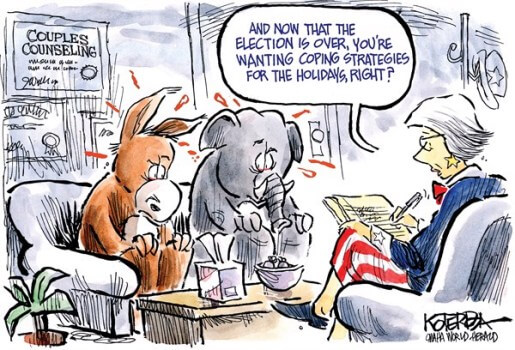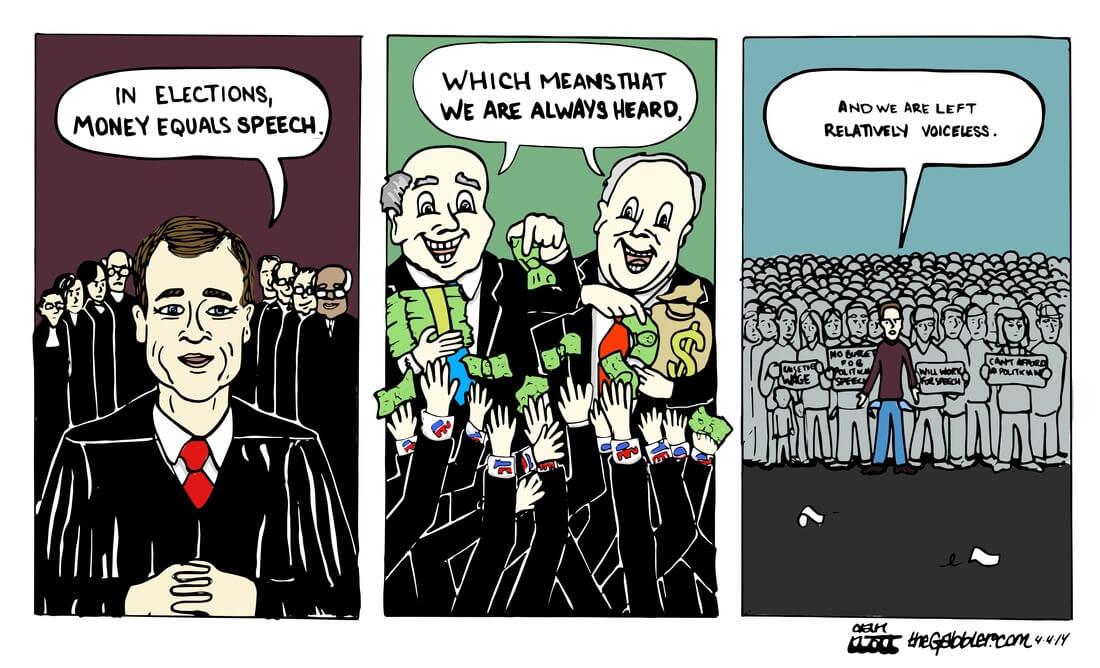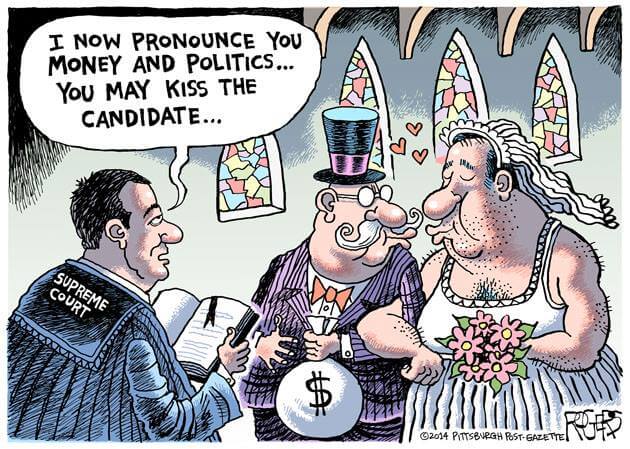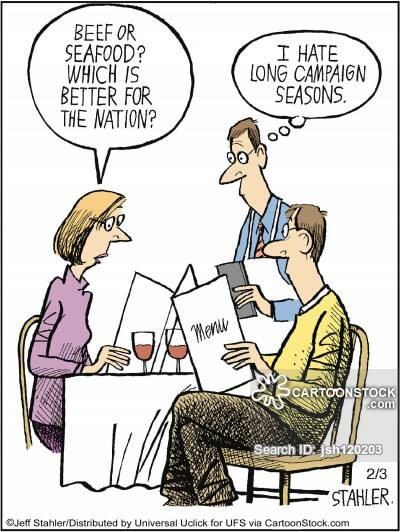I’m in the middle of writing a post about the benefits of a single-payer healthcare system. The inspiration for that came from a CNN Town Hall with Senator Kamala Harris (Dem., California) last week. Senator Harris is running for president in the 2020 election. It’s almost two years until that election, and already multiple people are declaring their candidacy. More than that, this is all completely normal. This made me ponder campaigning in the US; perhaps the whole process of campaigning is a big part of what’s driving the extreme partisanship in that country.
Anyway, rather than fill up the other post with my musings on the topic, I thought a short, separate post would do the trick.
As a result of all these people running for president, the media will be focusing on every little thing they say and do. And, because of the nature of the current president, he will also be commenting at length. I suspect it leads to more partisanship than there would be if there was a limit to campaign time. Here’s why.
The Job of a Politician
A politician’s job is helping to run the government on behalf of ALL those in their constituency. Doing that well requires compromise with and among people with multiple points of view. However, when they spend so much time publicly defining their differences, that kind of cooperation is all but impossible.
Even once an election is over, the rancour can’t just go away overnight. Politicians know that campaigning is par for the course. Arguing over policy positions is usually something politicians can get over. However, if politicians use dirty tricks to try and win, that changes things. Once it gets personal, that’s another matter and a longer campaign is more likely to lead to dirty tricks.

Money in Politics
The US has few limits on campaign funding. The source of candidates’ financial support can also be a very sore point. Some candidates only manage to continue campaigning because of multi-million dollar donations from one or two people. (Sheldon Adelson’s support of Rick Santorum comes to mind.) They have no real popular support, but they appear to have because of the amount of money they have in their campaign coffers.
Therefore, candidates who have broad support from people with less money available to support candidates must often stop campaigning while those with a few wealthy supporters can carry on. Those remaining then pick up votes from those who are more popular but had to leave the race. That causes ongoing resentment with the colleagues of a politicians who had to leave the race. Or, they simply may find it difficult to work with someone they feel doesn’t deserve to be in government.

As with dirty tricks, it’s the feeling that a candidate may have won unfairly that makes it more difficult to work with them. This issue was exacerbated in the US with the SCOTUS declaring Citizens United to be law in 2010. The Federal Electoral Commission was in opposition to the GOP-sponsored Bill, which basically declared corporations to be people. As such, big business could donate to political campaigns in a way they hadn’t been able to before.

Possible Solutions

‘Beef or seafood? Which is better for the nation?’
In most democratic countries, both these situations aren’t as serious as in the US. The majority have a legal limit on the time when politicians can engage in electioneering. In New Zealand (iirc – correct me if I’m wrong) it’s three months. Some other countries allow even less time. (I do note though that the US is a huge country and the way it picks its candidates is more time-consuming than most. Therefore, it would need more time than most of us to choose its leader. But, I suspect two years is still way more than is really necessary.) With a shorter election season there are at least two advantages.
Firstly, politicians have less time to, and are less likely to, engage in dirty tricks. Secondly, because the adversarial time is shorter, it doesn’t take as long to get over. Therefore, it’s a shorter time until politicians are ready to work together. It’s easy to say they should do this anyway, but they are people with feelings too.
Many countries, New Zealand among them, also have campaign spending limits that politicians must stick to. Candidates can and do lose their seats if they are found to be in breach of those limits. This means a potential candidate who is popular but not wealthy is able to run for election and stands a genuine chance. It also means, of course, that special interests (including business interests) have less chance of influencing politicians.
More Reform
There isn’t a country on the planet where the electoral system couldn’t use some reform to make it better and fairer. There is also a lot more that I could say about unfairness in the US system. However, as it’s more than 22 months until the 2020 election, I have plenty of time to write about those. I just had a need to get this point out of my system.
Note to Regular Readers:
Thanks so much for your kindness and patience over the last few months. Things are getting better, but it is a slow process. I especially continue to be absolutely blown away by the generosity of the reader who paid for a new chair for me. I don’t know where I would be without it.
Because I’m still working very slowly, I’m largely working on posts that aren’t time sensitive. That way I can do a little at a time until they’re ready for the site. There are several that are fairly close to completion, and hopefully you won’t have to wait too long for them.
If you enjoyed reading this, please consider donating a dollar or two to help keep the site going. Thank you.


I can agree with about all of it. And not just in the US, as you point out.
1 – Caps on donations by a specific party/person (which would go a long way to mitigate the disastrous ‘Citizens United’ decision).
2 – Obligatory transparency about who donated how much to whom.
3 – Limitation on the time of the actual campaigning season.
4 – A task force to go after trolling farms spreading dirt. (you did not mention that with so many words, but I thought it would fall under ‘dirty tricks’).
These things should not be difficult to implement, except for 4.
Another proposal – I think it was discussed here earlier- is that political parties can get state funding and will have to do with that -no ‘outside’ funding. Although a good idea in principle, the implementation appears more difficult.
The most important thing you mentioned is that the different parties should be able to (and encouraged to) cooperate after the elections. Your proposed measures would indeed definitely make that less difficult.
Good topic and I think it is safe to say, campaigning in the U.S. is now a continuous process that never stops. Note – Trump has gone out in the last two years and had these pathetic rallies, lots of them. They are nothing but more campaign. And why you say, would a person who won, go right out and campaign some more. Because they don’t know how to do anything else.
If campaigning is now the thing, actual working in government and doing what presidents or senators use to do is just eliminated. They no longer do that stuff. Trump pulled millions of his own dollars out and put into running for office. This seems to not be known by many but that is what happened. It takes tons of money to hire all the people and do all the travel even if you don’t start buying TV time.
It is still one year before the Iowa Caucus and we have many people already out there running. It is a joke. The only answer is constitutional amendments to fix the system. Campaign finance regulations have come and gone – they are history. The amendments must be specific and say total and complete public financing of federal elections for president and congress. You get $$ this amount, decided by congress for each person running and by office and that is it. You cannot use your money or any other money but what is publicly provided.
Totally agree. Our election process in the US really needs to be reformed from the ground up. Campaign financing where the largest donors can buy elections has to go, The start of campaigning shouldn’t be more than 1 year. Gerrymandering needs to be abolished and voting needs to be simplified. Our democracy is in dire need of fixing. Unfortunately, the process will have to battle all the special interests who want the status quo.
Heather, you and the comments preceding mine are on the mark; and have given me a lot to think about — it’s not something I’ve given much thought to in the past except to deplore the situation since I’m powerless to do anything about it. Not only does campaigning never stop, it pervades every aspect of political life. But I’m a cynic and think it’ll only get worse, as will the partisan divide. I would love to be pleasantly surprised, but won’t hold my breath.
You make good points here. Our current system is rigged, pure and simple. The only way Democrats win elections is to over-perform as we did in 2018…the largest Democratic turn out since the elections after Watergate. Blatant corruption lights a fire under Dems’ asses, and Trump uses a flame thrower. Republicans are fine with cheating, because they’ve been gas lighted into believing Democrats just want to raise taxes and give the spoils to minorities and poor people (the undeserving).
Mitch McConnell (American democracy’s grave-digger) said last week that the House’s bill to make voting easier by declaring election day a national holiday (among other things) was a “power grab”. Mitch crying about a “power grab” is so hypocritical, it’s almost funny. Republicans know that when voting isn’t a hardship, Republicans lose. When our very leaders don’t want the American people to vote, you know the system is rotten to its core. If we got money out of politics, banned gerrymandering, scrapped the electoral college, reinstated the Voting Rights Act, and automatically registered voters, this country would be on the right path for a healthy democracy; simply destroying today’s Republican party would go a long way in restoring our democracy. It is astounding that one party has no intention of creating a healthy democracy. Republicans in office are a pathetic joke, as are Trump supporters in general.
I heard that the other day as well – Mich McConnell, America democracy’s grave-digger. That is perfect.
Yeah, I agree. That’s him to a T. Love it!
I just read that Mr McConnel received 3.5 million from Mr Blavatnik, an associate of Mr Deripaska and Mr Vekselberg.
I don’t know how reliable the Dallas News is though, and it is more than a year old.
https://www.dallasnews.com/opinion/commentary/2017/12/15/putins-proxies-helped-funnel-millions-gop-campaigns
I checked it on Fact-check, and it is true, 3.5 million US$.
What is not true is that it is the biggest contribution to Mr McConnel’s election chest (as had been contended), not in a long way (eg. the Adelsons contributed 25 million US$). Nor is it clear it was connected to his support for ‘re-allowing’ dealings with Mr Deripaska.
I’m not sure if you follow the Heather’s Homilies Facebook page Nicky, so I’ll put this here for you too. It’s an article about all the stuff SCOTUS has done in recent years to favour the GOP, including/esp. in elections. https://www.law.com/nationallawjournal/2019/02/15/sen-whitehouse-theres-a-crisis-of-credibility-at-the-u-s-supreme-court/?slreturn=20190118195506
It seems that not only Republicans are rotten to the core…
The swamp is there, but it appears that in Mr Trump you have invited an alligator to get rid of the lizards…
Interesting, but scary article on The Atlantic about Russian-style kleptocracy infiltrating the US:
https://www.theatlantic.com/magazine/archive/2019/03/how-kleptocracy-came-to-america/580471/
I’m going to be lazy and wait until they’ve put this on SoundCloud. It sounds too interesting to miss but I find reading, especially computer screens, physically difficult these days.
I’m so sorry Heather, if reading computer screens becomes physically difficult it is worse than I thought. I thought that with your new donated chair life would have become easier, but if reading becomes a burden it’s pretty bad.
I really hope your physical situation will improve.
Thanks Nicky. The chair has made things much better. The reading thing has been an issue for years now, and I’ve learned to live with it. Of course, I miss reading; I used to be a voracious reader. Now, I’m a bit like Trump – I get a lot of my info from watching TV and news videos on my computer. However, I like to think I’m a bit better at evaluating what I see/hear than he is!
If I’m going to write about a topic, I do read and research stuff, but not as much as I should.
I wanted to say in a separate comment that I hope you continue to heal and I’m happy that you’re progressing. I miss your posts! (And I’m sure I’m speaking for a lot of readers here.) But I understand, there’s only so much a person can do. You take care of yourself Heather.
It’s Super-Bowl day here in America. I hope the Patriots lose! (But they probably won’t.)
Thanks so much Mark. I really appreciate your kindness and support.
When I do a full post on what I see as wrong with the US electoral system, I’m considering introducing it with this short video. It doesn’t cover everything, but is summarizes several of the issues.
https://www.youtube.com/watch?v=8X6zLCkqHd8&feature=em-uploademail
And this little video should tell everyone the system in the U.S. needs to be completely overhauled. Should have been years ago. You could hardly invent a worse system.
In the UK, we are given 60 Days, and that’s it. The US System to me is bizarre and corrupt, they need some real and lasting reforms, cut the money for a start and gerrymandering is rife and in the open. Also, a reformed and time and money limited system would remove hopefully any chance in the immortal words of HL Mencken, The White House being occupied by”a downright fool and complete narcissistic moron.”
While reform would be nice, there is, unfortunately, a good possibility that it will get worse. Trligious zealots have for years tried to repeal the Johnson Amendment and as the rethuglicans elect more and more fundagelicals, it gets closer and closer to actually happening. Why is this important you ask? This amendment to the tax code forbids all 501(c)3 tax exempt non-profit corporations from donating to or endorsing any candidate for political office. This includes churches which are a subset of the 501(c)3 group. BUT….. all such groups EXCEPT CHURCHES are required to file an annual tax form (form 990) with the IRS detailing their income and expenditures. Churches are exempt from this requirement which would make them able to funnel unknown quantities of money from unknown sources to political candidates with NO accountability whatsoever. You think Citizens United was bad? This would be an order of magnitude worse.
It’s not as easy as it sounds to regulate campaign contribution. When does a group of people lose the right to contribute money to a campaign?
Which of the following can donate?
A small, local hiking group who want to preserve a wild area who coordinate their money but donate separately.
A small, local hiking group who want to preserve a wild area who pool their money into one donation.
A large wilderness group that coordinates members’ donation.
A large wilderness group which pools money to donate.
A sole proprietor who donates under his name.
A sole proprietor who donates under his company’s name.
A partnership which donates under the individual names.
A partnership which donates under the companies name.
A partnership which donates individually but identify themselves as the owners of the partnership.
A group of 10 people who own a business donating individually.
A group of 10 people who own a business donating individually but identify themselves as the business owner.
A group of 10 people who own a business donating from their company.
A pair of workers who coordinate their donations.
A pair of workers who coordinate their donations but identify as workers of a company.
A union which coordinates the union members donations.
A union which pools union members donations.
A blogger.
A pair of bloggers who work together and blog on one website and make no money.
A pair of bloggers who work together and blog on one website and make a million dollars from it.
A media company that makes money solely from blogging.
A partisan media company that blogs solely to help elect someone.
The amount they donate is the issue, and whether or not the donation is known about by the public. The NRA is, imo, free to donate money to whatever campaign they wish. However, the problem I have is that the amount they give is so large that it can’t help but influence the politician concerned. And in many cases, that is the reason people donate as a bloc – to exert that sort of influence.
Motives are important too. Protecting wildlife is not a selfish motive, whereas in other cases (such as the NRA) influencing policy is. It’s also easier to ignore a wildlife group than the NRA in the US.
Having said that, it should be the same rules for the NRA and a wildlife group.
As far as I can see, the only reason to get together and donate as a bloc is to make your donation appear to be bigger and therefore attempt to influence the politician concerned. Some are above such influence, but many aren’t, though they may not be consciously aware of that.
I would suggest a whole new approach to campaign funding, such as one of the models used in other countries. In an environment such as the US where the raising of campaign finance is such a big deal, I’d say big donors can’t help but influence politicians. Perhaps the public funding of campaigns or spending caps would be a fairer way to go.
I would also add that while the amount of money is an issue (and that is only an issue because of the sheer cost of campaigning), the bigger problem is a lack of transparency. When you have huge sums of “dark” money being donated and the source of that money is hidden, then you have a situation where the elected official is being influenced by hidden sources. As was mentioned, large donations DO influence policy. If the voting public knows who is donating and thus influencing, the official can be held somewhat accountable, albeit after the damage is done. But if the public doesn’t know who is influencing the candidate, or even if the candidate is being influenced, there can be no accountability.
@BigBillK My first reaction was to agree with you totally about the dark money but then I thought about my personal situation. I was employed by a university which made some decisions that I disagreed with. My views are aligned with the ACLU of my youth but are now considered Alt-Right by younger fanatics. I was not willing to criticize the decisions under my own name because I feared for the effect on my future job prospects. The only safe way for me to speak up was anonymously.
I do not have an answer. I would like donors to be identified for the reasons you have stated but I would like them to be protected for the reasons I have stated.
Here I think the threshold for making an anonymous donation is NZ$9999. Once your donations go over that, they become public. I think that’s a pretty fair situation, though it would be up to the US to decided what the proper threshold for retaining anonymity is for them of course.
Yes, a cap on anonymous donations. NZ$9999 is about 7000 US$?
That would mean that CAIR’s donation to Ms Omar would remain anonymous. Jerry showed that all of their contributions went to Ms Omar, but it was only 5000 US$. Did not many members of CAIR donate on an individual basis (I’m not sure)?
An organisation (not pointing at CAIR in particular here) must not be allowed to pay their members some fee or support for officially something else, on the understanding they will make their just under (say) 7000 US$ donations.
I agree with Curtis it is not a simple problem.
The state subsidising political parties appears a good idea, but how will the cake be divided? I’ll start my own political party tomorrow. 🙂
This is reasonable compromise and I prefer it to the present US rules but it is not perfect. It is easy enough to pool a dozen $9999 donations and tell the recipient but not the public.